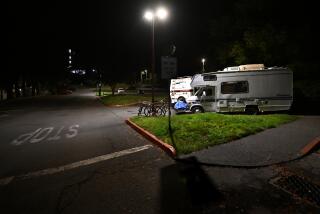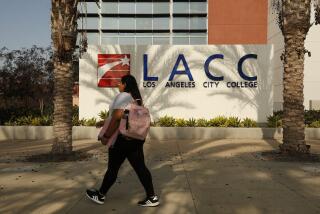Help on the road to higher education
Maria Martinez’s kitten heels clicked as she trailed behind a recent campus tour at UC Irvine.
Except for those short stiletto heels, Martinez might not have stood out from thousands of other prospective parents touring campuses in California this spring. But unlike most of them, Martinez had never seen the vastness of a large college campus before, and now she struggled to keep up in shoes that are ill-suited for walking.
Martinez, a garment worker, might have been even more unprepared if it weren’t for a 3-year-old program called Parent College, an unusual education effort run by the Partnership for Los Angeles Schools aimed at low-income and immigrant parents who don’t know enough about college to help their teenage children get admitted.
“There’s a myth that [such] parents don’t care about their child’s education but we see that’s not true,” said Saskia Pallais, director of family and community engagement for the nonprofit group.
Fifteen Los Angeles Unified campuses are managed by the Partnership, a nonprofit group founded by Mayor Antonio Villaraigosa.
The program consists of several years of Saturday workshops that teach practical knowledge such as how to read a report card and what life is like on a college campus. This year, 800 parents and students participated in the program’s annual college tour, the largest number in the program’s history.
Martinez is typical of the parents the program seeks to help. One of 14 children raised on a small farm outside the town of Irapuato in Guanajuato state in Mexico, she had no formal education as a child, and was 15 before she learned how to read on her own.
“Every so often, my father would enroll us in school, but we didn’t have money for notebooks or even a pencil,” Martinez said. Embarrassed, she would soon drop out, she said.
Education was not a priority for the family. Instead, Martinez and her sisters were expected by their father to “do women’s work,” she said — cooking, cleaning, and more of the same later for their husbands and children.
Eventually, the whole family, including Martinez’s parents and younger siblings, moved to Los Angeles.
Here, their ideas about school began to change slowly. Martinez’s youngest siblings went to school regularly. Martinez, then married, knew she wanted her children to have “what I didn’t have, and then some.”
But her plans remained vague. Of her five children, only three were born in the United States. The older two never considered college, and began working after high school.
For several years, Martinez and her husband, Luciano Fernandez, had jobs at American Apparel. Martinez said that before they were laid off in 2009 — after a federal investigation forced the company to fire more than 1,000 employees unauthorized to work in the U.S. — she took management training courses the company offered. They helped her form a better idea of the schooling she wanted for her children, she said.
But she was still short on specifics.
She found a job at another garment house. Her husband began selling fruit from a cart near their Boyle Heights home.
By then, her third child, Sergio, was showing promise in his schoolwork. “I got to a point where I knew I was going [to college] but I didn’t really know how to get there,” said Sergio, now 17.
In Sergio’s junior year, his Advanced Placement literature teacher told him about Parent College, and Martinez enrolled. In the monthly classes, she learned about college requirements and how to apply for financial aid.
Even after months of classes, participants in the program sometimes remain befuddled by the complexities of the U.S. education system. “It’s uncharted territory for them,” said Graciela Fernandez, director of the Student Outreach and Retention Center at UC Irvine.
During a breakout session with Latino parents at the Parent College tour, for example, one parent asked if the students were allowed to leave campus to visit home.
But Martinez said she has come a long way since she first began to wonder how best to educate Sergio. She said she often hears other parents in the program express fears of letting their children go to college, as if it were a strange, faraway land.
“I don’t feel that way, I encourage him to go. As parents, we give up so much for them so they can surpass our own hopes and dreams,” she said. “It’s the only inheritance we can leave our children.”
The program’s leaders “gave me the initiative to search for help,” Martinez said. “Before, I never knew what to ask or where to go.”
Sergio, a senior at Roosevelt High School, is anxiously waiting for acceptance letters to land on the dining room table. One of his top choices — Cal State Northridge — recently wrote, welcoming him in the fall.
Martinez plans to again wear her heels when they tour the Northridge campus — she is still the same person she was before, she said — but this time, at least she knows what she’s in for.
And besides, she added, she is so excited about her son’s future that she doesn’t mind if her feet hurt.
dalina.castellanos@latimes.com
More to Read
Start your day right
Sign up for Essential California for news, features and recommendations from the L.A. Times and beyond in your inbox six days a week.
You may occasionally receive promotional content from the Los Angeles Times.






